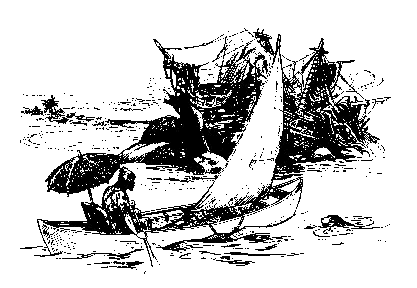My second load was a bag full of rice, the umbrella to set up over my head for shade, another jug of water, a cheese, a bottle of milk, and about two dozen barley cakes.
All these I carried around to my canoe. If there were men on board the wreck they might be in need of food.
When I had arranged everything in good order, I started out.
I kept the canoe quite close to the shore until I had rounded the point past which the dangerous current flowed. Being then in smooth water, I struck boldly out toward the wreck.
Soon, however, upon looking a little ahead of me, I saw the second current flowing in a great eddy past a long line of half-hidden rocks.
As I looked on these rapid currents, my heart began to fail me. I knew that if I should be driven into one of them, it would carry me a great way out to sea. It would carry me so far that I should never be able to get back again.
Yet I was determined to persevere in my venture.
I MAKE ANOTHER VOYAGE
(я предпринимаю еще одно путешествие)
WITH very great care I steered my canoe out to sea (с большой осторожностью я направил мое каноэ в море). I kept just within the edge of the current on my right hand (я держался точно у края потока по правую руку; within — в, внутри; edge — кромка, край; грань, граница). It carried me along at a great rate (он нес меня на большой скорости; rate — норма; ставка, тариф; темп; скорость, ход /как физическая характеристика/), but I did not lose control of the canoe (но я не терял управление каноэ).

In about two hours I came up to the wreck (примерно через два часа я добрался до судна, потерпевшего кораблекрушение). It was a sad sight to look at (это было грустное зрелище: «это было грустное зрелище, чтобы смотреть на него»).
The ship lay partly on her side (корабль частично лежал на боку), and was jammed fast between two great rocks (и был крепко зажат между двумя большими рифами).
She looked like a Spanish ship (он выглядел, как испанское судно). She had been badly broken by the waves (он был сильно поломан волнами), and everything on her decks had been swept away (и все с палуб было смыто /в море/; to sweep — мести; to sweep away — сметать).
As I came close to her (когда я подплыл к нему поближе), a dog looked over her side and barked at me (пес выглянул через борт и залаял на меня; side — сторона, бок). When I called him he jumped into the sea and swam out to the canoe (когда я позвал его, он прыгнул в море и поплыл к каноэ).
I lifted him on board (я поднял его на борт), and found that he was almost dead with hunger and thirst (и обнаружил, что он был почти мертв от голода и жажды).
I gave him a barley cake (я дал ячменную лепешку), and he devoured it like a half-starved wolf (и он сожрал ее, как полумертвый от голода волк; to starve — умирать от голода). I then gave him a little water (затем я дал ему немного воды), but not too much lest he should harm himself (но не очень много, чтобы он не повредил себе = чтобы ему не стало плохо). He drank (он пил), and then looked up as if asking for more (а затем посмотрел вверх, как бы прося еще).
After this I went on board (после этого я взошел на борт). A sad sight met my eyes (печальный вид встретил мои глаза; to meet — встречать). For in the cookroom I saw two sailors who had been drowned (потому что в камбузе я увидел двух моряков, которые утонули), with their arms fast around each other (с руками крепко вокруг друг друга = крепко обнявшись).
I suppose (я предполагаю) that when the ship struck (что когда корабль ударился = сел на мель; to strike — ударять) the waves dashed all over her (волны хлынули через него) and the men had no way of escape (и у людей/экипажа не было никакого пути спасения). Those who were not swept overboard (кого не смыло за борт: «кто не был смыт за борт»; to sweep — мести, сметать) were drowned between decks (утонули между палубами).
Besides the dog there was no other live thing on board (кроме собаки, не было никого другого живого существа на борту).
I found some chests that had belonged to the sailors (я нашел несколько ящиков, которые принадлежали морякам). With much labor I got two of them into the canoe without stopping to look inside of them (с большим трудом я затащил два из них на каноэ, не останавливаясь, чтобы посмотреть внутрь их).
